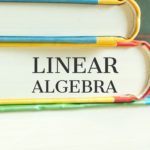Quiz 3. Condition that Vectors are Linearly Dependent/ Orthogonal Vectors are Linearly Independent

Problem 281
(a) For what value(s) of $a$ is the following set $S$ linearly dependent?
\[ S=\left \{\,\begin{bmatrix}
1 \\
2 \\
3 \\
a
\end{bmatrix}, \begin{bmatrix}
a \\
0 \\
-1 \\
2
\end{bmatrix}, \begin{bmatrix}
0 \\
0 \\
a^2 \\
7
\end{bmatrix}, \begin{bmatrix}
1 \\
a \\
1 \\
1
\end{bmatrix}, \begin{bmatrix}
2 \\
-2 \\
3 \\
a^3
\end{bmatrix} \, \right\}.\]
(b) Let $\{\mathbf{v}_1, \mathbf{v}_2, \mathbf{v}_3\}$ be a set of nonzero vectors in $\R^m$ such that the dot product
\[\mathbf{v}_i\cdot \mathbf{v}_j=0\]
when $i\neq j$.
Prove that the set is linearly independent.
Sponsored Links
Contents
Solution.
(a) Linearly dependent vectors
Since the set $S$ consists of five $4$-dimensional vectors, it is linearly dependent regardless of the value of $a$. Thus, for any value of $a$ the set $S$ is linearly dependent.
(b) Perpendicular nonzero vectors are linearly independent
Suppose that we have the linear combination
\[c_1\mathbf{v}_1+c_2\mathbf{v}_2+c_3\mathbf{v}_3=\mathbf{0} \tag{*}\]
for some scalars $c_1, c_2, c_3$.
To show that the set is linearly independent, we must show that $c_1=c_2=c_3=0$.
Taking the dot product with $\mathbf{v}_1$, we have
\begin{align*}
\mathbf{v}_1\cdot (c_1\mathbf{v}_1+c_2\mathbf{v}_2+c_3\mathbf{v}_3)=\mathbf{v}_1\cdot \mathbf{0}=\mathbf{0}.
\end{align*}
Distributing $\mathbf{v}_1$, we have
\begin{align*}
c_1\mathbf{v}_1\cdot\mathbf{v}_1+c_2\mathbf{v}_1\cdot\mathbf{v}_2+c_3\mathbf{v}_1\cdot\mathbf{v}_3= \mathbf{0}.
\end{align*}
Since the dot products $\mathbf{v}_1\cdot\mathbf{v}_2=0, \mathbf{v}_1\cdot\mathbf{v}_3=0$, we have
\[c_1||\mathbf{v}_1||^2=c_1\mathbf{v}_1\cdot\mathbf{v}_1=0.\]
Since the vector $\mathbf{v}_1\neq \mathbf{0}$, the length $||\mathbf{v}||\neq 0$.
Thus, we must have $c_1=0$.
We repeat the above argument with $\mathbf{v}_1$ replaced by $\mathbf{v}_2$ as follows.
Since $c_1=0$, the (*) becomes
\[c_2\mathbf{v}_2+c_3\mathbf{v}_3=\mathbf{0}.\]
We have
\begin{align*}
\mathbf{0}&=\mathbf{v}_2\cdot \mathbf{0}=\mathbf{v}_2\cdot (c_2\mathbf{v}_2+c_3\mathbf{v}_3)\\
&=c_2\mathbf{v}_2\cdot\mathbf{v}_2+c_3\mathbf{v}_2\cdot\mathbf{v}_3.
\end{align*}
Since $\mathbf{v}_2\cdot\mathbf{v}_3=0$, we have
\[\mathbf{0}=c_2\mathbf{v}_2\cdot\mathbf{v}_2=c_2||\mathbf{v}_2||^2.\]
Since $\mathbf{x}\neq \mathbf{0}$, we have $||\mathbf{v}_2||\neq 0$, and thus $c_2=0$.
Hence (*) is now just $c_3\mathbf{v}_3=\mathbf{0}$, and since $\mathbf{x}_3\neq \mathbf{0}$, we conclude that $c_3=0$. Therefore, we have shown that $c_1=c_2=c_3=0$, and thus the set $\{\mathbf{v}_1, \mathbf{v}_2, \mathbf{v}_3\}$ is linearly independent.
Comment.
These are Quiz 3 problems for Math 2568 (Introduction to Linear Algebra) at OSU in Spring 2017.
List of Quiz Problems of Linear Algebra (Math 2568) at OSU in Spring 2017
There were 13 weekly quizzes. Here is the list of links to the quiz problems and solutions.
- Quiz 1. Gauss-Jordan elimination / homogeneous system.
- Quiz 2. The vector form for the general solution / Transpose matrices.
- Quiz 3. Condition that vectors are linearly dependent/ orthogonal vectors are linearly independent
- Quiz 4. Inverse matrix/ Nonsingular matrix satisfying a relation
- Quiz 5. Example and non-example of subspaces in 3-dimensional space
- Quiz 6. Determine vectors in null space, range / Find a basis of null space
- Quiz 7. Find a basis of the range, rank, and nullity of a matrix
- Quiz 8. Determine subsets are subspaces: functions taking integer values / set of skew-symmetric matrices
- Quiz 9. Find a basis of the subspace spanned by four matrices
- Quiz 10. Find orthogonal basis / Find value of linear transformation
- Quiz 11. Find eigenvalues and eigenvectors/ Properties of determinants
- Quiz 12. Find eigenvalues and their algebraic and geometric multiplicities
- Quiz 13 (Part 1). Diagonalize a matrix.
- Quiz 13 (Part 2). Find eigenvalues and eigenvectors of a special matrix
 Add to solve later
Add to solve later
Sponsored Links















3 Responses
[…] Quiz 3. Condition that vectors are linearly dependent/ orthogonal vectors are linearly independent […]
[…] Quiz 3. Condition that vectors are linearly dependent/ orthogonal vectors are linearly independent […]
[…] Quiz 3. Condition that vectors are linearly dependent/ orthogonal vectors are linearly independent […]